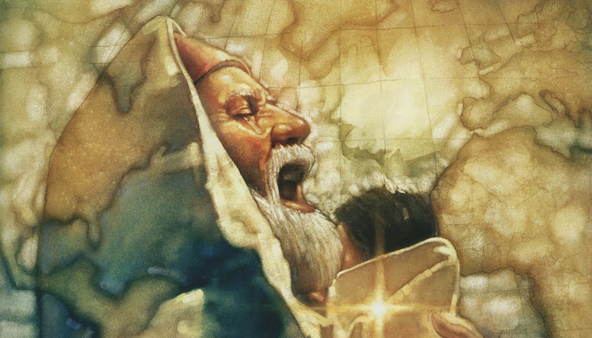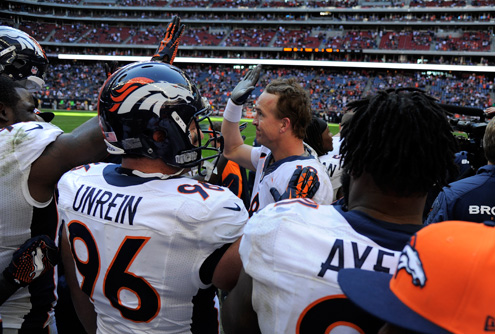Pastor Caitlin Trussell with Augustana Lutheran Church on May 15, 2016
[Sermon begins after the John reading. The Acts, Romans, and Genesis Bible readings are at the end of the sermon]
John 14:8-17, 25-27 Philip said to him, “Lord, show us the Father, and we will be satisfied.” 9 Jesus said to him, “Have I been with you all this time, Philip, and you still do not know me? Whoever has seen me has seen the Father. How can you say, “Show us the Father’? 10 Do you not believe that I am in the Father and the Father is in me? The words that I say to you I do not speak on my own; but the Father who dwells in me does his works. 11 Believe me that I am in the Father and the Father is in me; but if you do not, then believe me because of the works themselves. 12 Very truly, I tell you, the one who believes in me will also do the works that I do and, in fact, will do greater works than these, because I am going to the Father. 13 I will do whatever you ask in my name, so that the Father may be glorified in the Son. 14 If in my name you ask me for anything, I will do it. 15 “If you love me, you will keep my commandments. 16 And I will ask the Father, and he will give you another Advocate, to be with you forever. 17 This is the Spirit of truth, whom the world cannot receive, because it neither sees him nor knows him. You know him, because he abides with you, and he will be in you.
25 “I have said these things to you while I am still with you. 26 But the Advocate, the Holy Spirit, whom the Father will send in my name, will teach you everything, and remind you of all that I have said to you. 27 Peace I leave with you; my peace I give to you. I do not give to you as the world gives. Do not let your hearts be troubled, and do not let them be afraid.
[sermon begins]
One reason to get to a doctor’s appointment early is to fill out paperwork. Another, more fun reason, is to cruise the magazines. I’ve learned gems about stream fishing, NFC West football teams, and the latest architectural trends. Most recently, Time Magazine’s 100 Most Influential People edition caught my eye. I started it in a doctor’s office and, in a rare move, picked up a copy at the grocery story to finish it. My curiosity was piqued by Lin-Manuel Miranda.[1] He wrote and starred in the musical “Hamilton” that is nominated for 16 Tony Awards. On his play-writing process, Mr. Miranda says, “I think of it like this, what’s the thing that’s not in the world that should be in the world?” Great question. “What’s the thing that’s not in the world that should be in the world?”
It’s a question that moves beyond simply reacting to events. What I mean by “reacting to events,” is a bit Newtonian. A lot of us learned this in school somewhere along the way – that every action has an equal and opposite reaction. Action-reaction. Except, somewhere along the way in human relationships, it became fashionable to escalate our reactions to stratospheric proportions. No longer action-reaction. It’s action-super reaction. And fear is the catalyst that seems to speed up the reaction time. When left to its own devices, fear reactions quickly move beyond the processing speed of our brains’ gray matter. A useful tidbit about fear…just because you think you’re thinking, doesn’t mean you’re using higher brain functioning. Fear-based, reactive thinking tends to boil down to concerns about rewards and punishments.
The Genesis reading this morning about the Tower of Babel is a case in point. The people make a plan to prevent being “scattered abroad upon the face of the whole earth.”[2] The plan involves available materials – “brick for stone and bitumen for mortar.”[3] To build themselves “a city and a tower with a top in the heavens.” Their plan doesn’t work out as their language is confused and they’re “scattered abroad from there over all the earth, and they left off building the city.” Their fear and plan didn’t prevent a thing.
Paul speaks directly about fear in his letter to the Roman church:
14 ‘For all who are led by the Spirit of God are children of God. 15 For you did not receive a spirit of slavery to fall back into fear, but you have received a spirit of adoption. When we cry, “Abba! Father!” 16 it is that very Spirit bearing witness with our spirit that we are children of God…’
Not a spirit of slavery to fall back into fear, but a spirit of adoption as children of God. I highly recommend reading the full chapter of Romans 8 when you get the chance this week. It pretty much rocks.
As creatures made in the image of God, we can think about the past and imagine into the future.[4] Sometimes we’ll get it right. Sometimes we won’t. This is why Mr. Miranda’s question is so enlivening. “What’s the thing that’s not in the world that should be in the world?” Notice that the question is NOT, “What’s the thing in the world that I most need to protect myself from?” It’s also NOT, “What’s the thing in the world that I most need to be anxious about?”
Mr. Miranda’s question kindles the imagination. It is a creative question. At the Rocky Mountian Synod Assembly two weeks ago, Dr. Shauna Hannan gave the key note series.[5] She is a preaching professor at Pacific Lutheran Theological Seminary. Her key-note was separated into four talks about creativity – God’s, creation’s, ours, and the Bible’s. She led us through worshipful and specific creative tasks by way of the creation story in Genesis 1. She talked about being aware of roadblocks to creativity. One of my own roadblocks is fear. When I’m fearful or anxious about an outcome – like, let’s just say a sermon deadline when the thoughts won’t gel and life is full – it’s tough for the imagination to kick in.
When we think about “creativity,” the tendency is to think of the arts – painting, poetry, dance, photography, etc. Pentecost even inspires this artistic focus. There’s the vibrant red to symbolize the Holy Spirit and the “divided tongues, as of fire” that appeared among the people. Look up images for Pentecost and flames abound.
Pentecost is one of those slippery church festival days because there is no explanation for it. The sight of flames and people from all over the known 1st century world. The sound of rushing wind and all those languages. The Bible verses in Acts practically scream to be rendered artistically because the intellect is insufficient to capture it. That’s the beauty of art and the wonder of a creating God. On the creating process, God answers the question, “What’s the thing that’s not in the world that should be in the world?” God’s answer? The church.
Oh sure, there are many examples of the church regressing into “a spirit of slavery to fall back into fear.”[6] The church has done more than its share of injury to the world in crusading around sowing blame and reaping death. There is much to confess, repair, and reconcile still today.
Did you also know that the church raced into towns during pandemics throughout the centuries?[7] Christians nursed the sick into health and consoled the dying. While some died themselves, others developed immunity to the deadly diseases and continued their work. Could this be a little of what Jesus means in the Gospel of John when he tells his disciples that they “will do greater works” than even Jesus?![8]
Most of what happens in the world, especially the good and the kind, is quieter. The church will occasionally take on acts that have magnitude. This congregation even has a few of those under its belt. However, discounting the magnitude of our individual, faithful actions is habitual. Most of what happens in the world – especially the good and the kind – doesn’t make the front page or go viral on YouTube or get nominated for 16 Tony awards. More often the church moves into the world less visibly through people of faith like you and me.
The creativity of that church looks a million different ways – bringing things that are not yet in the world but should be in the world. It looks like speaking a kind word at the risk of appearing weak, de-escalating a tense scene, or sitting with someone in pain. It looks like company owners paying a living wage to their employees. It looks like hiring someone with a criminal record and not knowing if redemption is possible. I know you can add to this list with experiences you’ve had on the receiving end of someone else’s creative interaction with you. The good news is that we have a companion in creating what should be in the world for the sake of the world.
Jesus says in the Gospel of John:
“I have said these things to you while I am still with you. 26 But the Advocate, the Holy Spirit, whom the Father will send in my name, will teach you everything, and remind you of all that I have said to you. 27 Peace I leave with you; my peace I give to you. I do not give to you as the world gives. Do not let your hearts be troubled, and do not let them be afraid.”
Here’s the good news. We are baptized and sent by the Holy Spirit as people of faith in the world to bring new things into the world in obedience to God our Father. Our companion is the Spirit of dreams and visions.[9] The prayer we pray over the newly baptized is a good prayer for us today as we have received a Spirit of adoption and are given peace by the same Spirit.[10]
Let us pray. We give you thanks, O God, that through water and the Holy Spirit you give your daughters and sons new birth, cleanse them from sin, and raise them to eternal life. Sustain us with the gift of your Holy Spirit: the spirit of wisdom and understanding, the spirit of counsel and might, the spirit of knowledge and the fear of the Lord, the spirit of joy in your presence, both now and forever. Amen.
[1] Time. The 100 Most Influential People: Lin-Manuel Miranda. Combined issue for May 2 and May 9, 2016. http://time.com/4299633/lin-manuel-miranda-2016-time-100/
[2] Genesis 11:4
[3] Genesis 11:3
[4] Pastor Deb Coté, Pastors’ Text Study conversation on May 10, 2016. Genesis 1:27
[5] Shauna K. Hannan, Ph.D., Biography Link: http://www.plts.edu/faculty/profile.php?id=shannan
[6] Romans 8:14-17
[7] Charles E. Moore. Pandemic Love: http://www.plough.com/en/topics/faith/discipleship/pandemic-love. Rev. Moore is an educator and lives in the Bruderhof, an intentional community based on Jesus’ Sermon on the Mount.
[8] John 4:12
[9] Acts 2:17
[10] Romans 8:15 and John 14:27
___________________________________
Romans 8:14-17 14 For all who are led by the Spirit of God are children of God. 15 For you did not receive a spirit of slavery to fall back into fear, but you have received a spirit of adoption. When we cry, “Abba! Father!” 16 it is that very Spirit bearing witness with our spirit that we are children of God, 17 and if children, then heirs, heirs of God and joint heirs with Christ—if, in fact, we suffer with him so that we may also be glorified with him.
Genesis 11:1-9 Now the whole earth had one language and the same words. 2And as they migrated from the east,* they came upon a plain in the land of Shinar and settled there. 3And they said to one another, ‘Come, let us make bricks, and burn them thoroughly.’ And they had brick for stone, and bitumen for mortar. 4Then they said, ‘Come, let us build ourselves a city, and a tower with its top in the heavens, and let us make a name for ourselves; otherwise we shall be scattered abroad upon the face of the whole earth.’ 5The Lord came down to see the city and the tower, which mortals had built. 6And the Lord said, ‘Look, they are one people, and they have all one language; and this is only the beginning of what they will do; nothing that they propose to do will now be impossible for them.7Come, let us go down, and confuse their language there, so that they will not understand one another’s speech.’ 8So the Lord scattered them abroad from there over the face of all the earth, and they left off building the city. 9Therefore it was called Babel, because there the Lord confused*the language of all the earth; and from there the Lord scattered them abroad over the face of all the earth.
Acts 2:1-21 When the day of Pentecost had come, they were all together in one place. 2 And suddenly from heaven there came a sound like the rush of a violent wind, and it filled the entire house where they were sitting. 3 Divided tongues, as of fire, appeared among them, and a tongue rested on each of them. 4 All of them were filled with the Holy Spirit and began to speak in other languages, as the Spirit gave them ability. 5 Now there were devout Jews from every nation under heaven living in Jerusalem. 6 And at this sound the crowd gathered and was bewildered, because each one heard them speaking in the native language of each. 7 Amazed and astonished, they asked, “Are not all these who are speaking Galileans? 8 And how is it that we hear, each of us, in our own native language? 9 Parthians, Medes, Elamites, and residents of Mesopotamia, Judea and Cappadocia, Pontus and Asia, 10 Phrygia and Pamphylia, Egypt and the parts of Libya belonging to Cyrene, and visitors from Rome, both Jews and proselytes, 11 Cretans and Arabs—in our own languages we hear them speaking about God’s deeds of power.” 12 All were amazed and perplexed, saying to one another, “What does this mean?” 13 But others sneered and said, “They are filled with new wine.” 14 But Peter, standing with the eleven, raised his voice and addressed them, “Men of Judea and all who live in Jerusalem, let this be known to you, and listen to what I say. 15 Indeed, these are not drunk, as you suppose, for it is only nine o’clock in the morning. 16 No, this is what was spoken through the prophet Joel: 17 “In the last days it will be, God declares, that I will pour out my Spirit upon all flesh, and your sons and your daughters shall prophesy, and your young men shall see visions, and your old men shall dream dreams. 18 Even upon my slaves, both men and women, in those days I will pour out my Spirit; and they shall prophesy. 19 And I will show portents in the heaven above and signs on the earth below, blood, and fire, and smoky mist. 20 The sun shall be turned to darkness and the moon to blood, before the coming of the Lord’s great and glorious day. 21 Then everyone who calls on the name of the Lord shall be saved.’

![Lin-Manuel Miranda of “Hamilton” Asks: “What’s the thing that’s not in the world that should be in the world?” [OR: A Sermon for Pentecost] John 14:8-17, 25-27; Genesis 11:1-6; Romans 8:14-17; Acts 2:1-21](https://caitlintrussell.org/wp-content/uploads/2016/05/lin-manuel-miranda.3.sermon-Caitlin-Trussell-672x372.jpg)








